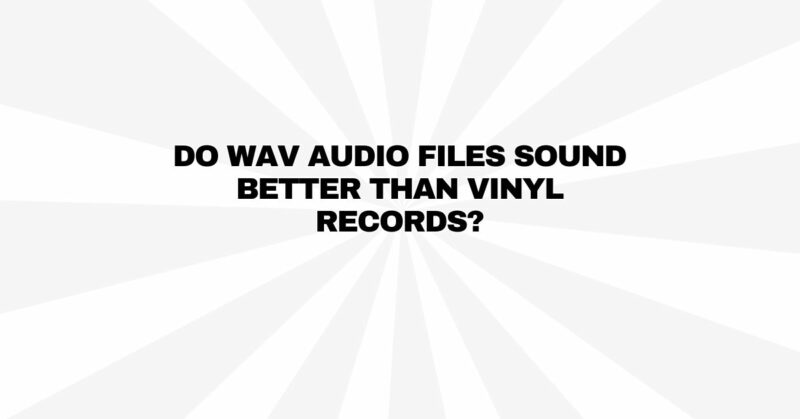The debate over audio formats, with a focus on digital versus analog, has been a long-standing topic of discussion among audiophiles and music enthusiasts. Two prominent contenders in this discussion are WAV audio files, representing the digital realm, and vinyl records, emblematic of analog audio. The question at hand is whether WAV audio files sound better than vinyl records, and to answer this, we must explore various aspects of audio quality, listening experience, and personal preferences.
Understanding WAV Audio Files:
WAV, short for Waveform Audio File Format, is a lossless digital audio format known for its high fidelity and uncompressed nature. Here are some key characteristics of WAV audio files:
- Lossless Format: WAV files are uncompressed, meaning they retain all the original audio data without any loss or compression. This results in audio that is bit-for-bit identical to the source.
- Digital Precision: WAV files capture the entire frequency range and dynamic range of the original recording with utmost precision. This format is often used for professional audio production due to its uncompromising fidelity.
- Convenience: WAV files are versatile and can be played on various digital devices and software. They offer a straightforward way to archive and transmit high-quality audio.
Understanding Vinyl Records:
Vinyl records, on the other hand, are a classic analog audio format that store music in physical grooves etched onto the surface of a vinyl disc. Key characteristics of vinyl records include:
- Analog Warmth: Vinyl records are celebrated for their analog warmth, character, and imperfections. This warmth adds depth and emotional resonance to the music, often described as having a unique, “organic” quality.
- Tactile Engagement: Playing vinyl records involves a tactile and hands-on experience, creating a unique connection to the music. Selecting a record, placing the needle on the groove, and watching the disc spin contribute to a distinct ritual.
- Dynamic Range: Vinyl records often have a wide dynamic range, capturing and reproducing subtle nuances in music.
- Imperfections: Vinyl’s imperfections, including surface noise, pops, and clicks, are considered part of its charm by enthusiasts. These analog quirks contribute to a more authentic and engaging listening experience.
Comparing WAV Audio Files and Vinyl Records:
To determine whether WAV audio files sound better than vinyl records, we need to consider several factors:
- Audio Quality: WAV files offer pristine digital audio quality with no loss of data. They capture every detail of the original recording. Vinyl records, while known for their analog warmth, can introduce imperfections and noise during playback.
- Convenience: WAV files provide convenience in terms of portability, storage, and playback. They can be easily transmitted over digital platforms and played on various devices with compatible software or hardware. Vinyl records require physical storage space and playback equipment, which may not be as accessible or practical for all listeners.
- Tactile Experience: Vinyl records offer a unique tactile engagement that some listeners find deeply satisfying. This physical interaction with the medium is not replicated by digital formats.
- Subjective Preference: The preference for WAV files or vinyl often depends on individual tastes. Some listeners prioritize the precision and convenience of digital formats, while others value the analog warmth and character of vinyl records.
- Equipment: The quality of playback equipment significantly affects the listening experience. High-end turntables and cartridges can maximize the potential of vinyl records, while high-quality DACs and amplifiers can enhance WAV file playback.
Conclusion:
Determining whether WAV audio files sound better than vinyl records is ultimately subjective and contingent on individual preferences, priorities, and the listening experience one seeks. WAV files offer digital precision, convenience, and uncompromising fidelity, making them a popular choice for archiving and playback in professional settings.
Vinyl records, on the other hand, provide a unique analog warmth, tactile engagement, and authentic imperfections that many enthusiasts cherish. The choice between WAV files and vinyl often comes down to the specific qualities one values in their listening experience.
Some listeners may prefer the clinical accuracy and convenience of digital formats, while others are drawn to the warmth and authenticity of analog playback. Both formats have their place in the world of audio, ensuring that listeners have diverse options to suit their individual tastes and lifestyles. Ultimately, the “better” format is a matter of personal choice and the specific qualities one seeks in their musical journey.


